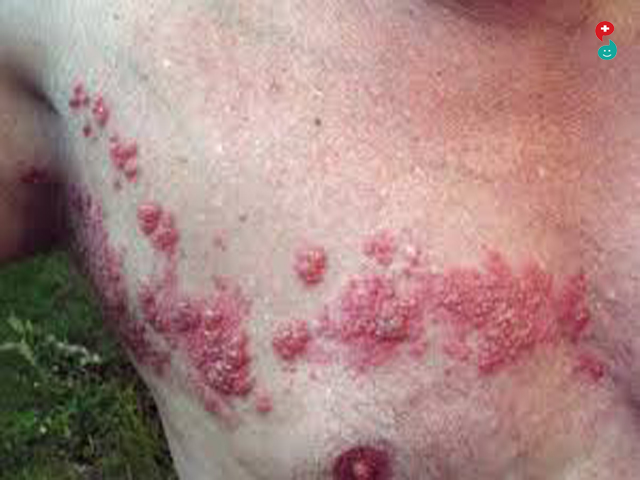
Cryptococcosis is caused by a fungus known as Cryptococcosis neoformans. The infection may be spread to humans through contact with pigeon droppings or unwashed raw fruit. Contact with an infected individual may also spread the infection. Individuals with disorders characterized by lowered immunity (for instance, HIV infection) are at high risk for contracting these infections.
Cryptococcosis may appear in various forms depending on how the infection is acquired. In most cases, the infection begins in the lungs (pulmonary form) and may then spread to the brain, urinary tract, skin, and/or bones (disseminated form). When the infection is limited to the lungs, symptoms may be minimal or not apparent at all. Respiratory symptoms may include coughing and chest pain. When the infection spreads, it tends to seek out the central nervous system, especially the brain. In some affected individuals, inflammation of the membranes surrounding the brain and spinal cord (meningitis) may occur as a serious complication. Symptoms associated with meningitis may include dizziness, blurred vision, severe headache, and/or stiffness of the neck. In such cases, immediate treatment is essential to help prevent potentially life-threatening complications.
Signs & Symptoms
The pulmonary forms of this disease include acute infections and chronic pulmonary infections. The disseminated forms include central nervous system (brain) infections, cutaneous (skin) infections, and infections involving other organs or systems.
Pulmonary forms.
Acute infections are only rarely diagnosed except in patients with weakened immune systems. In people with normal immune systems, cryptoccosis may not result in any symptoms at all (asymptomatic).
Chronic pulmonary infections may generate rather large masses in the lobes of the lungs, as well as segmental pneumonia (involving parts of lungs), fluid in the lungs (pleural effusions), and swollen lymph nodes.
Disseminated forms
Central nervous system infections, especially of the brain, may present as only modestly severe rather than acute. Complications may include an abnormally large head (hydrocephalus) and failing sight, among others.
Cutaneous or skin infections may present as fluid-filled bumps (papules), hardened plate-like patches (plaques), and ulcerous sores.
Infections of other organs or systems may involve sight (chorioretinitis), ears (otitis), the heart (myocarditis, endocarditis), the digestive system (gastroduodenitis, hepatitis), and the kidneys.
In general, symptoms of various forms of cryptococcosis may include: chest pain, dry cough, headache, nausea, confusion, blurred or double vision, fatigue, fever, unusual and excessive sweating at night, swollen glands without the appearance of infection in nearby areas, skin rash, pinpoint red spots (petechiae), bleeding into the skin, bruises, unintentional weight loss, appetite loss, abdominal bloating, abdominal pain, abdominal swelling, weakness, bone pain, and numbness and/or tingling.
Causes
Cryptococcosis is caused by the fungus Cyptococcus neoformans. It is spread by contact with pigeon droppings, unwashed raw fruit or by infected individuals. People with immune deficiencies or lowered immunity (such as people undergoing cancer chemotherapy or organ transplants or those infected with HIV-AIDS) are at high risk for contracting this fungal infection.
Affected Populations
Cryptococcosis occurs worldwide. In the United States it occurs predominately in the Southeastern states and usually in adults aged forty to sixty years of age. It tends to occur more often in males than females. Individuals with disorders involving reduced or impaired immunity to infection are particularly at risk.
Related Disorders
Meningitis is a possible complication of cryptococcosis. Meningitis is an inflammation of the membranes surrounding the brain and spinal cord. There are many types of Meningitis, caused by many different infectious agents with the severity of infection ranging from mild to severe.
Toxoplasmosis is an infectious disease that can be caused by contact with a microscopic parasitic organism called Toxoplasma gondii. This parasitic infection, found worldwide, can be either acquired or present at birth. The congenital type is a result of a maternal infection during pregnancy which is transmitted to the fetus, and involves lesions of the central nervous system. These lesions may lead to blindness and brain dysfunction. The disorder may be most severe when it is transmitted to the fetus during the second through the sixth month of pregnancy. Only 20% to 80% of those affected will show the presence of toxoplasmosis antibodies when tested. (For more information on this disorder, choose “Toxoplasmosis” as your search term in the Rare Disease Database.)
Diagnosis
The diagnosis depends on proof of the presence of Cyptococcus neoformans in either a bodily fluid or body tissue. The presence of the fungus may be seen under a light microscope in some circumstances; other circumstances require growing the organism from samples of fluid taken from a patient. An immunological test designed to detect the substance that would be mobilized in the body to fight this fungus if it were present (antigen) is available in commercial kits.
Standard Therapies
Treatment
Among the antibiotics used to treat cryptococcosis are the anti-fungal agents Amphotericin B, Flucytosine, and Fluconazole. These drugs may have serious side effects, so it is important for their use to be monitored carefully. Individuals with compromised immune systems, or under immune suppressive therapy, should be given prolonged drug treatment to prevent relapses.







